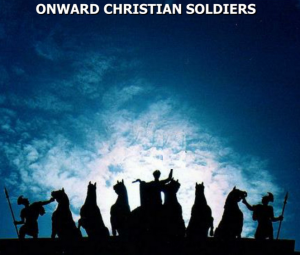DOMINION COMMANDED
 PMW 2025-067 by Kenneth L. Gentry, Jr.
PMW 2025-067 by Kenneth L. Gentry, Jr.
The postmillennial hope is not just a hope. It is a command given to use by Christ himself. We must exercise our hope in promoting his kingdom on earth.
The postmillennial view is the only one of the four major evangelical eschatologies that builds its case on the very charter for Christianity, the Great Commission (Mt 28:18–20). David Brown wrote over a century ago:
“The disciples were commissioned to evangelize the world before Christ’s second coming; not merely to preach the Gospel, ‘for a witness,’ to a world that would not receive it till he came again . . . but to accomplish, instrumentally, the actual ‘discipleship of all nations,’ to baptize them when gathered in, and to train them up as professed Christians in the knowledge and obedience of the truth, for glory – all before his second coming. In the doing of this, He promises to be with them – not merely to stand by them while preaching a rejected Gospel, and to note their fidelity, but clearly to prosper the work of their hands unto the actual evangelization of the world at large, before his coming.”
God’s Law Made Eas y
y
(by Kenneth Gentry)
Summary for the case for the continuing relevance of God’s Law. A helpful summary of the argument from Greg L. Bahnsen’s Theonomy in Christian Ethics.
See more study materials at: www.KennethGentry.com
Sixty-five years later postmillennialist O. T. Allis cited the Great Commission and commented:
“There is no room for pessimism or defeatism in these words. The Captain of our salvation is an invincible commander. His triumph is sure and assured.”
Dispensationalists scoff at postmillennialists because the latter “believe that the Great Commission will be fulfilled” (Charles Ryrie). Amillennialists such as Anthony Hoekema also note the postmillennial reliance upon the Great Commission. But the postmillennial case, based (in part) on the Great Commission, is not so easily dismissed.
Here I will mention the Great Commission as New Testament evidence for Christianity’s victorious future. The Great Commission reads:
Then Jesus came and spoke to them, saying, “All authority has been given to Me in heaven and on earth. Go therefore and make disciples of all the nations, baptizing them in the name of the Father and of the Son and of the Holy Spirit, teaching them to observe all things that I have commanded you; and lo, I am with you always, even to the end of the age. Amen.” (Mt 28:18–20)

Keys to the Book of Revelation
(DVDs by Ken Gentry)
Provides the necessary keys for opening Revelation to a deeper and clearer understanding.
See more study materials at: www.KennethGentry.com
Here are the disciples, just days after the Roman procurator oversees their Lord’s cruel crucifixion. Christ confronts the little group, who had all forsaken him and fled (Mt 26:56) in fear of the Jews (Jn 20:19). Though earlier he confines their ministry to Israel (Mt 10:5–6; 15:24), he now commissions them to disciple “all the nations.” Luke traces the gospel’s nascent progress among the nations in Acts, which takes up the history of the Christian faith where the Gospels leave off. Acts opens with the Lord reissuing a commission to the same few disciples. He directs them to promote his message in “Jerusalem, and in all Judea and Samaria, and to the end of the earth” (Ac 1:8); Acts ends in chapter 28 with Paul in Rome (Ac 28:16). This progress from Jerusalem to Rome witnesses thousands of conversions, testifying to the dramatic spread of Christianity.
Only after claiming the Lord God’s unbounded authority over heaven and earth (Mt 28:18; cf. Mt 11:25; Jn 17:2) does Christ commission his disciples. And we must carefully note the nature of his commission. As I note above (p. 224), non-postmillennial writers greatly reduce its meaning — and this despite the wording being unambiguously clear. They have Christ simply sending the disciples into the world, or being a verbal witness to all men, or providing a testimony to others, or preaching the gospel message far and wide. These ideas are obviously included in the commission, for without them it could not even get started. But these notions fall far short of the full implications of what Christ actually commands. Only the postmillennial approach adequately handles the greatness of this Great Commission.
According to the Commission’s specific wording the Lord Jesus Christ commands his disciples to go forth and actually make disciples of all the nations. They are not simply to preach the word to all, that is, simply to deliver the message. Rather, they are to labor to bring the hearers under Christ’s yoke of authority. They are to lead the nations to baptism into the name of the Triune God and to formally instruct them in all things that he taught them. They themselves are “disciples” of Christ, as we see in many Gospel references (e.g., Mt 10:1; 11:1; 13:36; 16:24). Their task in this Great Commission is to replicate in others what Christ has effected in them. They are to make “all the nations” his disciples, just as they have become his disciples. Though the task is enormous, and though their numbers are few, and though they are initially fearful and fumbling, Christ promises that he will be with them (and all his people) “throughout all the days” (pasas tas hemeras) until the end (Mt 28:20) to insure the task’s successful completion. Thus, the enormous task may take much time, he encourages them to understand that he is with them to see that they accomplish it in good order. They are not left to themselves: the Lord of Glory not only commissions them but accompanies them in their task.

Greatness of the Great Commission (by Ken Gentry)
An insightful analysis of the full implications of the great commission as given in Matthew 28:18-20. Impacts postmillennialism as well as the whole Christian worldview.
See more study materials at: www.KennethGentry.com
Clearly pessimistic assessments of the Great Commission, such as the following by A. denHartog, are without warrant:
“We do not imagine that there will be a worldwide conversion of all or even of the majority of peoples on the earth. The Lord gathers unto Himself a remnant according to the election of his grace.”
Even a cursory reading of the Commission shows that it strongly supports the optimistic postmillennial eschatology by commanding God’s people to seek the discipling of all the nations. This encourages Christ’s church to seek universal victory among men, in service of the King of kings and Lord of lords (1Ti 6:15; Rev 17:14).
Kenneth L. Gentry Jr.'s Blog
- Kenneth L. Gentry Jr.'s profile
- 85 followers



